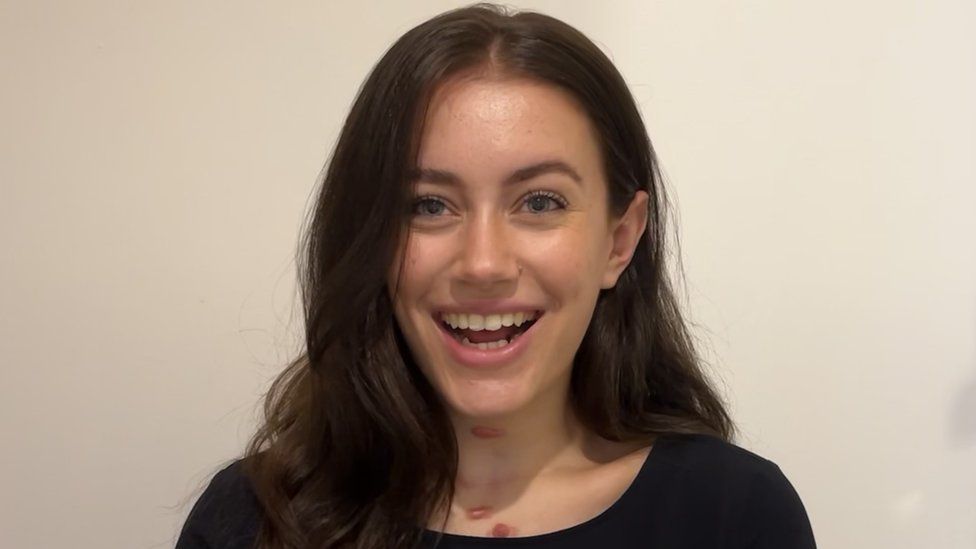The online dating world can be overwhelming at the best of times.
First there’s the swiping and matching, before you even have to worry about being ghosted or maybe even meeting the person in real life.
But it can be especially tricky if you’ve experienced something as life-changing as cancer treatment.
Natalie didn’t really consider cancer to be a huge part of her identity when she decided to go on dating apps after her treatment ended.
“It really threw me that the first thing people saw were the scars on my neck,” the 22-year-old tells BBC Newsbeat.
“Within about 24 hours of joining, I had about 10 messages along the lines of ‘I can see you have a lot of hickeys on your neck’.
“It was frustrating that I joined as an empowering clean slate. I’m in a new place and nobody knows me as the cancer girl. And it was the first thing people saw.”
Natalie, who had treatment for thyroid cancer, says she learnt how to be thick-skinned but it still ruined her experience of dating.
“I have a dark sense of humour about my cancer and I think a lot of young people do as a coping mechanism,” she says.
“The fact that people didn’t care about the impact of their words frustrated me. Dating is meant to be fun and it took the fun out of it for me.”

Natalie, who lives in Devon, decided to delete the apps after a few months and wants people to think more about how they talk to someone who’s had cancer.
And that’s something 24-year-old Mattie Carr agrees with.
She was diagnosed with stage 4 Hodgkin Lymphoma, a rare type of blood cancer, when she was 23.
“In a weird way, getting diagnosed for me was a huge relief because doctors hadn’t been able to tell me what was wrong for years,” she says.
Once her treatment was successful, Mattie moved from Sussex to live with friends in London and decided to start dating.
But she felt like she couldn’t avoid talking about her cancer because it took up so much of her life.
“I was a bit self-conscious because I had a port [device] in my chest which sticks out a lot on me,” she says.
“Even when I was walking about on the streets, I would have random people come up to me and ask me what it was.
“And every time I would go on a date, someone would ask about it.”

Mattie also says it meant she struggled to answer all the first date questions – like “what do you do for fun?” – without it coming up in conversation.
“I wasn’t able to socialise in big places so it was really hard to answer a lot of the questions without touching on cancer,” she says.
Like Mattie, Serena Sahota decided to start dating about five months after her treatment for oral cancer.
She was 19 when she was diagnosed and had a 12-hour operation to remove some lymph nodes from the neck, as well as part of her mouth, tongue and wisdom teeth.
“I was a bit anxious about the idea of dating because I didn’t know how or when to bring up cancer,” says Serena, who lives in Oxford.
“But then I thought ‘why shouldn’t I date, I’m no different from anybody else’.
“I didn’t mention it unless I’d been talking to that person for a long time because I don’t want the whole date to become about my cancer.”

Tips for dating after cancer
Natalie, Mattie and Serena have all been supported by the Teenage Cancer Trust.
Hannah Jackson, who’s one of the charity’s youth support co-ordinators based in Glasgow, says her priority is helping people build their confidence after treatment.
“It’s really important they feel empowered to live their life in the way they want to and date who they want to date,” she says.
So we asked the girls for their top tips when it comes to dating after cancer:
- Be yourself – it can be scary if you’ve been through some physical changes but if it’s the right person, they won’t care
- Have a support network – you need to speak to people who’ll understand the full spectrum of emotions that come with dating
- Only share what you want – be open about your cancer journey once you’ve built up a rapport with someone, sharing could help filter out unsupportive people
- Prepare for rejection – it happens to everyone and is unlikely it’s because of your diagnosis, so arm yourself with a list of positive qualities about yourself

If you have been affected by any of the issues in this article, you can find support on BBC Action Line.

What are dating apps doing?
Serena’s going back to university in September so has put her dating life on pause until then – but thinks app bosses need to take more responsibility for harmful comments.
“I’ve had a few difficult comments on the apps and nothing’s really gotten done about it,” she says.
So Newsbeat asked Hinge, Bumble and Tinder for more information on their reporting policies if you come across a harmful message.
Hinge says they have an in-app reporting feature that allows them to take “immediate action” and they use technology which scans profiles for “red-flag language”.
Bumble says it has AI technology to monitor profiles and identify violations including harassment and hate speech in over 100 languages.
Tinder encourages people to make use of the self-reporting tool on all profiles so the dedicated team can investigate the complaint, which may include removing the profile.


Follow Newsbeat on Twitter and YouTube.
Listen to Newsbeat live at 12:45 and 17:45 weekdays – or listen back here.
Related Topics
- Cancer screening
- London
- Dating
- Oxford
- Life
- Dating apps
- Online dating
- Glasgow
- Cancer
Related Internet Links
-
Teenage Cancer Trust
